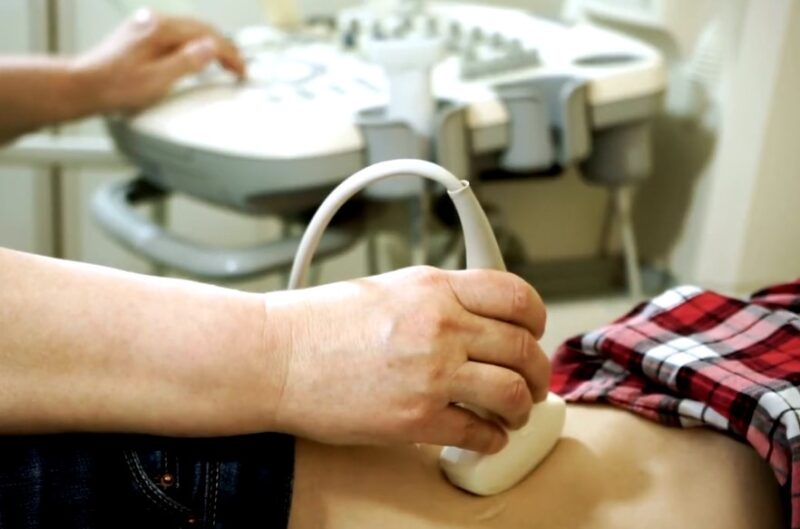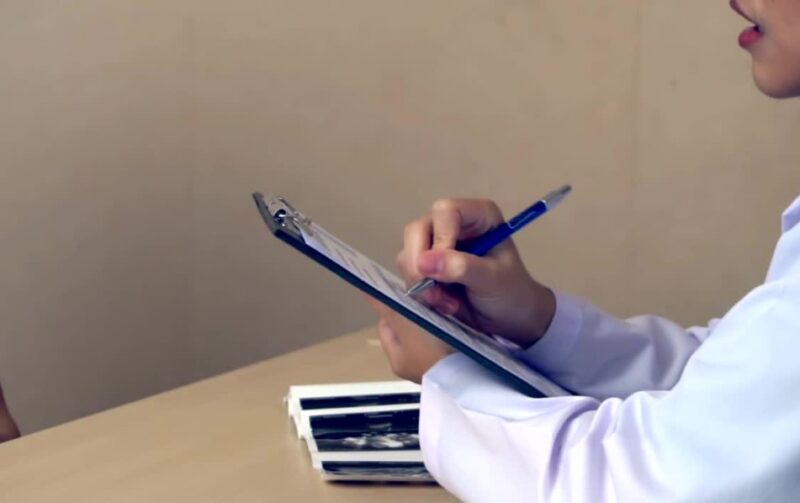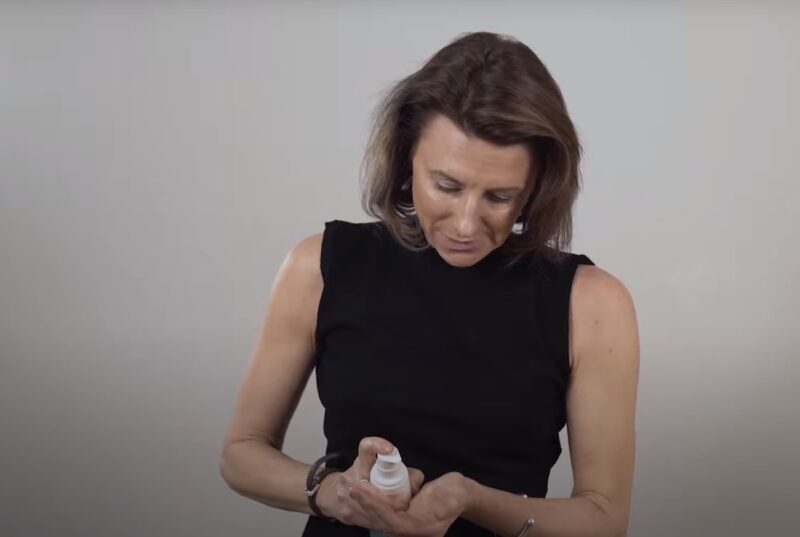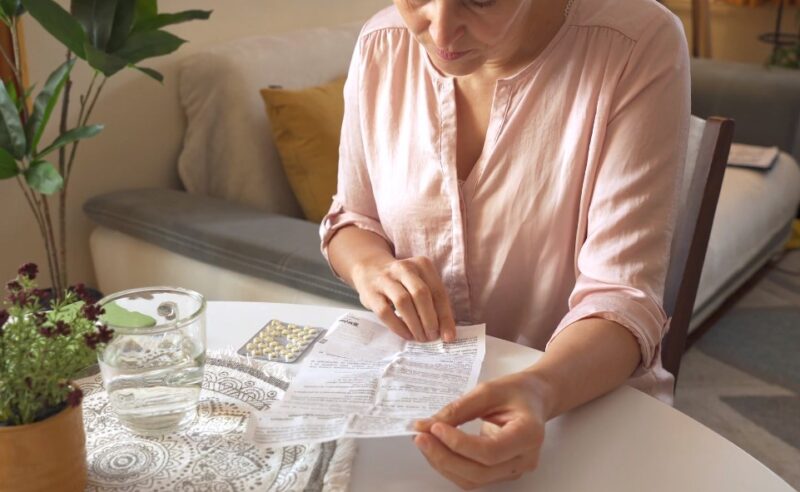One of the best things about menopause (yes, there are more than one) is the end of your periods. But bleeding has been a major part of my menopause journey this year and it’s lead to a worrying couple of months.
It began with a GP appointment. It had been almost six months since I’d been given Evorel Conti as a make-do hormone replacement therapy (HRT) after COVID-19 precautions stopped me getting a coil fitted and I needed a new prescription.
However, I was a bit concerned because I was bleeding. Often. Every couple of weeks I would have a “period”, sometimes as heavy (and almost as painful) as my true ones, and in between I would rarely go more than a couple of days without spotting. I’d had to put away my nice knickers and wear the old faithful, the sort your mam would warn you about not having a road accident in.
Obviously, I did what everyone in this situation does and turned to Google and read:
Most women do not have a regular monthly period with Evorel Conti. However, bleeding or spotting does often occur in the first few months until treatment settles down.
Closer googling unearthed forums on Mumsnet where other women were also having bleeding, so I took a deep breath and accepted it.
Key Takeaways
Fast-Track to Worryville

When I mentioned my concerns to the locum doctor who was filling in during the pandemic, he suggested switching to the coil and said he’d inform Dr. B, who handles the fittings.
But Dr. B’s reaction was different. Suddenly, she was arranging for me to be fast-tracked for ultrasounds and consultations with gynecologists to check for cancer.
I was in the middle of brushing my teeth when she called, and I ended up sitting on the bathtub’s edge, shocked. Cancer hadn’t been mentioned on Mumsnet.
Dr. B was incredibly supportive, explaining her worries and why she believed immediate action was necessary. It was crucial to eliminate any serious conditions, she emphasized. Then, almost immediately after we hung up, she called back, suggesting I stop my HRT, which made my heart skip a beat. (Eventually, we agreed on reducing the dose since I was apprehensive about stopping altogether.)
That moment led me to a decision: given my family and in-laws’ history with cancer, I chose to keep this to myself until there was definitive news to share.
Oh, the widespread debate over How Much Water to Drink for an Ultrasound! The clinic advised two liters, but a quick consultation on Twitter revealed much variation. Some said a pint was enough, while others recounted tales of drinking too much and needing to let some out. I settled on a pint and a half, hoping for the best.
At the women’s health center, where motherhood is celebrated
I find medical procedures utterly intriguing, and I was captivated as the technician called out measurements and commented on my “resting” left ovary versus my “youthful” right one, noting an “11” follicle.
Off to The Women’s Health Centre

A few weeks later, I was at the closest women’s health center, ready to meet with the gynecologist. The name “women’s health center” puzzled me, as everything there—from literature to posters—focused solely on pregnancy and childcare. It was more like a shrine to motherhood than a general women’s health facility.
This internal monologue helped distract me from my worries.
Despite my outward calm when discussing the upcoming tests, insisting there was nothing to worry about, a persistent voice in my head kept whispering, “What if…?” Particularly since I had started bleeding again that morning…
My anxiety peaked to the point that when instructed to undress and cover myself with a paper sheet “like a sarong,” I ended up removing all my clothes and clutching the sheet around me for modesty.
“Noooo,” the gynecologist chuckled. “Only the lower half needed to be uncovered!”
That certainly lightened the mood.
Then, there I was, legs in stirrups, making small talk about the weather in true British fashion while various instruments were introduced into my vagina for examination.
“Your cervix is a bit…”
“Odd?” I suggested. “That’s what I was told in Spain during a smear test. They had trouble because my cervix was oddly positioned.”
“Well,” the gynecologist replied, “I wouldn’t say it quite like that. It’s… elusive. Likes to play hide and seek.”
That moment highlighted the cultural differences between Spanish and British healthcare approaches.
Regardless of its quirks, my cervix decidedly dislikes being prodded, whether for smears or biopsies. I shut my eyes, focusing on mindfulness techniques, breathing deeply, and trying not to picture John Hurt in Alien.
Eventually, the gynecologist finished, praising my cooperation. “You’ve been great. I’m waiting on your scans, but I’m sending the biopsy off immediately. It might be related to the HRT, but if it’s cancer, we’re prepared to tackle it head-on.”
Fistula Fistbumps

After my appointment with the gynecologist, I surprisingly found myself less anxious than expected. Her straightforward explanation of the procedures and reasons behind them instilled a sense of calm in me: if there was an issue, I was in capable hands, and it was best to know sooner rather than later.
Sharing my journey not only helped prepare her but also served as a reassurance to myself. It underscored the existence of a systematic approach and the expertise available to handle such situations.
More crucially, it allowed me to alleviate some of the mental burden I had been carrying by keeping everything under wraps. Bringing it to light helped me gain perspective and focus on the facts, which suggested that my situation was likely linked to HRT rather than something more serious.
The relief was immense when I received a letter confirming my suspicions and indicating that all was well. The letter also provided a wealth of medical specifics for me to delve into, and I amusingly realized that discussing the size of my uterus could become my new “party trick.”
I also got an update from my Twitter friend, who shared that she was dealing with fistulas.
“Fistula fistbump,” I responded with a sense of camaraderie.
I wonder if she’s as curious about the specifics of her condition as I am about mine…
Looking to The Future

So now it looks as if I may finally get to my holy grail of HRT – a Mirena coil and oestrogen gel – 20 months after I was recommended it by the now-head of the British Menopause Society.
The ironic thing is, emotionally, I’m actually feeling really well on the Evorel Conti! I’m taking it with Sertraline, which seems to be counter-acting the effects of progesterone on me, and except for one bad episode of menopause depression, I’ve been more emotionally stable than for a long time. I’ve still had a few bleeds, however.
Any advice?
Finally, if you are experiencing bleeding after menopause, please go see your GP straight away. In fact, let’s make that an order – GO AND SEE YOUR GP.
And share your medical facts with me afterwards.
FAQ
Is bleeding during menopause normal?
Bleeding after menopause is not typical and should always prompt a consultation with your GP to rule out any underlying conditions.
Can hormone replacement therapy (HRT) cause bleeding?
Yes, HRT, especially in the initial months of treatment, can cause bleeding or spotting. However, continuous or unexpected bleeding should be evaluated by a healthcare provider.
What treatments are available for post-menopausal bleeding?
Treatment options may include adjustments to HRT, such as changing the type or dose, and in some cases, surgical interventions. The exact treatment depends on the cause of the bleeding.
How can I communicate effectively with my healthcare provider about menopause symptoms?
Keep a symptom diary, be clear about your concerns and symptoms, and discuss your treatment goals and preferences. Ask questions and seek clarifications whenever necessary.
What should I do if I’m anxious about post-menopausal bleeding?
It’s understandable to feel anxious, but the best action is to see your GP as soon as possible. Early evaluation and management can address the cause and alleviate anxiety.
Can lifestyle changes impact menopausal symptoms and bleeding?
Yes, maintaining a healthy lifestyle, including regular exercise, a balanced diet, and avoiding smoking, can positively impact menopausal symptoms. However, lifestyle changes alone may not resolve post-menopausal bleeding, which requires medical evaluation.
The Bottom Line
Navigating the menopause journey, especially with unexpected bleeding, can evoke a mix of emotions and concerns.
Through personal anecdotes and shared experiences, it becomes evident that effective communication with healthcare providers, openness to exploring different treatment options, and the support of a community are pivotal.
The importance of being proactive about health issues, like post-menopausal bleeding, and seeking professional advice cannot be overstated.
